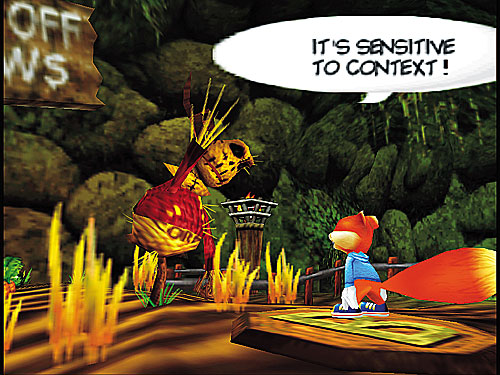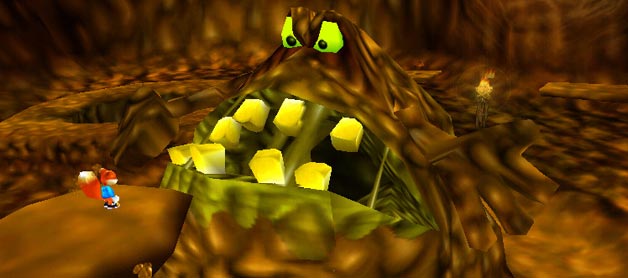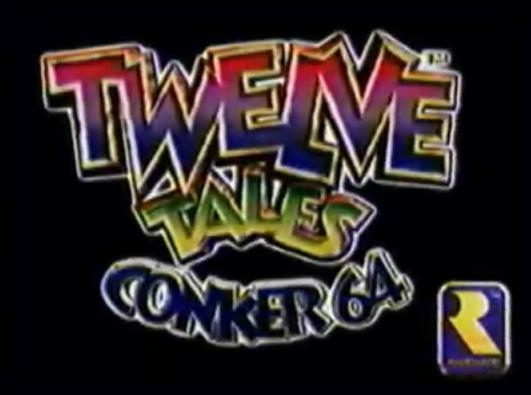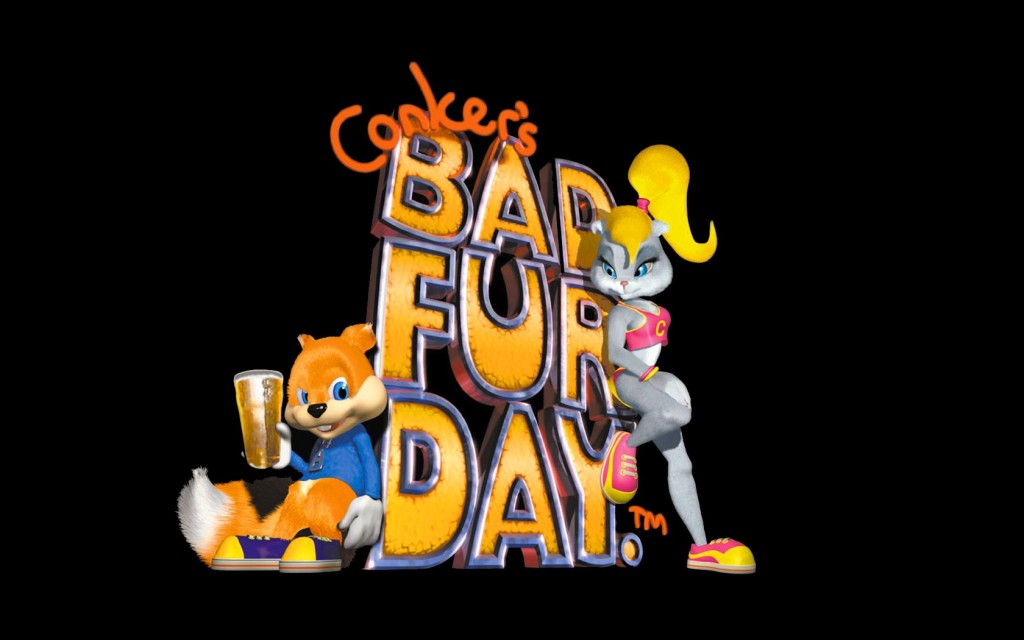Last updated on November 13, 2014
NOTE: For obvious reasons, this article is for adults only. You have been warned.
Conker’s Bad Fur Day remains a pinnacle of video gaming. Its wild combination of genres, mini-games, and setting under the common title of platformer make it a joy to play, while the depth of these individual segments are telling of Rare’s complete dedication to their craft. Every segment brims with ideas probably forged from five to six years of analyzing different ways to enhance Super Mario 64, and their progression in that regard was amazing. We might think of Banjo-Kazooie, Tooie, and Donkey Kong 64 as mere test runs, while elements of Goldeneye, Blast Corps, and even Diddy Kong Racing even find their way into the mix. The ludicrous, hilarious story only adds to the the experience, usurping the expectations of players for a game to be both interesting and funny. It’s unfortunate that Rare hasn’t made a game of this calibur, nor may such a game ever emerge from the studio, but one can certainly play and replay Conker’s Bad Fur Day (and its remake on Xbox) with a wink and smile. That Rare shamelessly steals from itself, and other entertainment mediums, means that their ironic setting creates a story, narrative, and game that totally deviates from the norm.
Now, getting into the story-
“Wait! What the heck is this game doing on here? Isn’t this a Christian website? Why in God’s name would you put a vulgar and horrific game like that on a list of the best games?”
“Well, if you’d give me a moment-
“I’m not going to. The game’s full of bad language, naughty jokes, toilet humor, and it’s really depressing at the end. How could a Christian ever say it’s a great game!?”
“I have a very good explanation-
“I’d love to hear it, because I DO NOT see how you can call yourself a Christian and like this dirty, filthy game! What’s wrong with you?”
“There’s a lot I could say-
“And, furthermore, what’s with all the innuendo? Isn’t this a family website, at the very least? Do you think God would approve of this sort of behavior, and especially YOU recommended something like this? Haven’t you read Ephesians 5, or are you one of those “new” Christians who thinks they can just make stuff up? For it says-
“Yes, yes, I know-
“But obviously you don’t. So here’s a reminder:
Therefore be imitators of God, as beloved children; 2 and walk in love, just as Christ also loved you and gave Himself up for us, an offering and a sacrifice to God as a fragrant aroma. 3 But immorality or any impurity or greed must not even be named among you, as is proper among saints; 4 and there must be no filthiness and silly talk, or coarse jesting, which are not fitting, but rather giving of thanks. 5 For this you know with certainty, that no immoral or impure person or covetous man, who is an idolater, has an inheritance in the kingdom of Christ and God.
See? Obviously you don’t know your Bible.”
“I’d beg to differ-
“But begging to differ against God is not the way to win.”
And on it goes. Any righteous Christian would dismiss you out of hand, especially if they knew what the game contained. We’re also talking of an era where Grand Theft Auto III didn’t rock the game industry – Conker’s “mature”, yet juvenile approach was novel. Video games were a “kid’s” thing. Conker was an anomaly, and anyone playing it certainly wasn’t a Christian. Good thing nobody knew about it when it came out!
Why, why, WHY would a theologian ever like Conker’s Bad Fur Day? That’s a question I’ve been asking myself for a long time. Honestly, I adored it when I first bought it, and even bought it again at full price. There’s not many people that would be that fanatical (or stupid, maybe) to buy the exact same game again, but then again, games like this don’t come around often. I don’t think the answer is as simple as me being young, impressionable, and rebellious. I, and my parents, could easily tell you that I was none of these things. I did not do dumb things when I was a kid; I was, surprise, a nerd, but not an anti-social one. I just liked video games a whole lot, and I liked talking about them. So, hearing much about BFD (and that’s definitely an acronym for a bad phrase, I think), I decided I was old enough to handle it. Whatever “Mature” meant on the box, no game so far really took it so far over the edge that my parents had to shield my delicate eyes from the horrors of sin appearing on screen, reaching out to my retinas and burning crazed images of hellfire forever into my mind.
One would assume a game with a orange squirrel on the box wasn’t going to destroy my sanity. And it didn’t, I’m glad to say. Rather, what I got was a highly entertaining video game, one that wasn’t afraid to think outside the box and, quite literally, surprise the player at every turn.
There’s plenty of cartoons out there for “adults”, but there’s a difference between vulgar humor for vulgarity’s sake (which seems to be the case with the more recent Family Guy and Futurama) and vulgarity for the purpose of showing something more. Conker does creative things with its cartoonish setting. The whole point, then, is irony. Nothing is as it seems in the realm of Windy, and neither is Conker, surprisingly enough.
Conker, partying with his soon-to-be drafted buddies at the Cock and Plucker, has a bit too much to drink. Wandering out of the bar, he proceeds to bump into a random passerby and throw up on him. Obviously, he’s totalled. Wasted, Conker walks off somewhere into the night. When he finally wakes up, he finds himself with a raging hangover, and definitely in some place he’s never been before. He meets Birdy the scarecrow, who is just as drunk as Conker was. He also teaches the player about the magical Context Sensitive Button. Marked by a giant B, they make a “ting” noise. Surprise, for Birdy, this makes a beer appear, which Birdy proceeds to drink down with vigor. Press it again and he’ll drink a can of helium for absolutely no reason.

So yeah, if you can’t deal with this kind of randomness and non-sequiturs laced with crazed innuendo or humor, I suggest you stop reading this. It says it on the box: this game is for people 17 and over, and that appears true enough.
When you press the B button next to the other pad, Conker will magically cure himself with some alka-seltzer, and remark on the usefulness of the CS buttons (as well as telling you how to skip cutscenes). What’s brilliant about this setup, other than making me laugh at its absurdist nature, is that the humor becomes a tutorial without the player noticing. Sure, I am being taught what the buttons are, but that isn’t a detriment; it’s integrated right into the story so that the player doesn’t even notice. It’s better than having a text box appear every five seconds to describe a new function, that’s for sure. Conker’s thought bubbles become a way to teach the player new abilities while still integrating it into the story. Even the health powerups are explained, and hilariously so.
The Context Sensitive Button is a game mechanic that, while seemingly unremarkable, allows Rare to play around quite a bit with genre and game style. In effect, Rare integrates content from many of their games into a single, linear experience. Conker does everything from feed cows prune juice to…excrete waste violently, to throwing toilet paper at singing piles of poo. But it’s not all toilet humor; we’ve got a zombie/vampire hunting segment, a warzone, prehistoric times, and just about any usual setting in a game each with its own Context Sensitive buttons. It turns into a great first-person shooter in these latter segments, showing the strains of Goldeneye and Perfect Dark. The Xbox version improves these further with dual analogue control, basically integrating Rare’s development skills right into the game. A racing segment gives a hint of Diddy Kong Racing’s excellent controls, while basic platforming abounds in Banjo-Kazooie-esque segments scattered throughout. It’s almost as if they transplanted these segments directly from the games in question. Hey, if you’re going to steal ideas, why not steal from yourselves? It has truly varied game mechanics from start to finish, all crammed into a short length. Even this, alone, would be cause for applause, but the Rare of old never settled for less.

The story and characters, really, just comes out of total left field. It’s hilarious at most points, and goes through what appears as the story beats of multiple action movies from the 1990s, with references strewn endlessly throughout. As of now, much of these remain completely dated (the Matrix segment, particularly, suffers from this, even as it’s better than any official Matrix game), but anyone with a nostalgic bone in their body for pop culture would do well to seek this game out. There’s plenty of lists online detailing these, but it’s better if I leave them to the player to discover.
Even if it’s a great game experience, it’s odd that a company so reverent of Japanese game design would suddenly impugn that same quality of game design by almost ripping themselves off outright, self-awarely pointing out the “game-like” nature of these segments in many instances. It’s not very family friendly; if anything, it’s violent, dirty, and cynical. If, as a Rare employee suggested, “Rare was always looking East at Japanese and Nintendo’s games in particular, with their open-hearted childlike vibrancy and playfulness,” where did that go?
Why would Rare make a game like this? Supposedly, they found that their output with Conker, originally yet another platformer like Banjo-Kazooie, was just too similar to everything else they developed in the period between 1994-2000. As such, it was imperative that they mix the formula up in a way that shocked and amazed people, and potty-mouthed forest rodents worked as well as anything else. The original Conker’s Bad Fur Day, because of how late it was released, sold only 55,000 or so (dwarfed by the remake, which sold over fourteen times as much). “Cult game” describes it well.

There could be other reasons, though. Rare was a second-party developer to Nintendo. In a way, they were forced to make the kind of innocent, goody two-shoes games like Banjo and Donkey Kong by virtue of their stock holder. It fit the Nintendo brand. So why in God’s name would Nintendo allow the release of Bad Fur Day remains beyond my comprehension. It’s almost like they expected it wouldn’t sell, given that it came out only eight months before the Gamecube dropped onto the market.

Rare was probably mad, no doubt; their creativity at their peak, their masterpiece, was relegated to an incredibly short shelf-life and ultimately led to their sale to Microsoft. Rare’s cofounders, Chris and Tim Stamper, left the company two years after that acquisition. Imagine, Star Fox Adventure came out for Gamecube in 2002, and by this time Rare hadn’t made a single game. Star Fox Adventures had to fit that family image, and was so even before Dinosaur Planet was transplated into Nintendo’s famous franchise. At least for Conker, it’s obvious that something happened within Rare.
As the story goes by Microsoft’s reckoning:
“They were 50 per cent owned by Nintendo and Nintendo had an option to acquire the other half of the company by a certain date. If they didn’t exercise that option then Rare had the option to find a buyer for Nintendo’s half. Nintendo had already extended the option by one year, but it looked like they weren’t going to acquire the other half of Rare, so the Rare guys started looking around to see if anyone else might be interested. We were a logical choice for them to call.”
Of course, this is my own speculation, but I can’t imagine the idea of a cynical take on Nintendo’s darling formula was any coincidence. Perhaps they really didn’t care about how well their games sold, or who played them, but what game developer asserts that kind of position? Even if you’ve got the dream job of a lifetime, having your development idol buy your company would probably be the deal of a lifetime – but Nintendo did not. The creative partnership was broken, then, Rare becoming a victim of their own success and going to where they are today: making motion control games for Xbox’s Kinect. A far cry from their former glory, to be sure.
The atmosphere of the buyout (definitely known by employees at the time) augments the cynical nature of the game. It’s a commentary on the obsequious nature of the 3D platformer at the time, which had such a singular focus that, at times, it could get somewhat tedious. Rare itself was as much a culprit of the Collect-a-thon as any other developer; Donkey Kong 64 was the height of that trend, requiring the player to collect nearly 6 or 7 different kinds of objects for various purposes. Having 5 characters might sound like it adds variety, but the five apes in that game differ little apart from aesthetics. It would appear that Conker was almost a direct rebuttal to that kind of game design, as it does exactly the opposite. It’s not open ended, and it has loads of cutscenes, a story, and continually comments on the player and the increasingly absurd events that happen therein.

But, of course, we’re visiting these setting with cartoon characters that are quite self-centered, and more than act like real people, even if they are also funny. That’s the weirdly endearing part of the whole experience. Conker acts against type, more like a normal purpose thrown into extraordinary circumstances than the traditional cartoon character. He has friends, he drank a little too much, now he’s in a big mess for a whole day. But what strikes me about him, other than how terrificially he (and everyone else) speaks his lines and talks, is the fact that he’s completely selfish. Now, I’m sure anybody who had a hangover really just wants to get home, but Conker? He’ll do anything for that, and anything for money. Money, in fact, replaces the token objects of the platformer, acting similarly to Mario 64’s Stars or Banjo-Kazooie’s Jiggies. They’re not really a plot device so much as an expression of the character himself, a “greedy bastard” (as the money might say) who really doesn’t care so much for anything as his own well-being. Yes, he’s likable and funny, and you don’t want him to die, but you just can’t help looking at him with a bit of disdain even amidst the humor.
You get to see his thoughts as well as his words, and they’re usually just as cynical and downright awful as you’d expect. Rescuing and helping people comes at a cost, either with money or through blackmail (I won’t spoil that particular segment). Even though he’s searching for his girlfriend, Berri, for much of the game, it’s not like he really cares all that much. He’s just trying to survive in a world gone wrong, right? Doesn’t that justify him?
Interestingly enough, Rare’s answer is: no, it does not. One could take an excessively nihilistic view of the ending in that nothing he does actually matters, but I prefer to give the game a more theological shine, given my proclivities. Spoilers ahead, for those wondering.
Conker plays with conventions to break them because it’s not what your expecting. What you are expecting is, in fact, a happy ending. Imagine, though, that the protagonist is a lovable but self-serving man who does nothing but for his own gain. In the end, the game locks up as he is about to die in his final confrontation with Heinrich (long story) the alien from Alien but not really. Conker, then, makes a deal with the developer of the game: he’ll make sure not to tell anyone about this game-breaking bug – in return, you have to give me stuff. So, he gets a Japanese katana, teleports himself back to the throne room of the Evil Panther-Type King, and kills the xenomorph in blistering cool style. Ain’t that grand!?
Several characters, happy that the King is dead, force Conker to become the new King to rule over them. Sure enough, Conker, ever the self-interested one, has absolutely no intentions to rule over an entire kingdom and vehemently rejects the offer. After doing so, he realizes he forgot to bring Berri, his girlfriend back to life. During the final battle, she is sucked out of the spacecraft, and subsequently dies. Conker realizes this too late; the developer has fled the scene, leading to Conker’s forced regnancy.
Now, what is interesting here is that Berri stays dead. The mouse who explodes because he eats too much cheese and becomes filled with flatulent gas? He’s stitched back together for the finale. Anybody Conker didn’t like? All shoved into a room with him, attached to him only now that he’s become the King of the land. Now he has all the money in the world. Everything he wanted throughout the game and acted selfishly to get. And now he can’t get the one thing in the world he wants: Berri. So Conker’s speech at the end rings quite true:
So there I am. King. King of all the land. And who’d have thought that? Not me. I guess you know who these guys are now. I certainly do. I don’t want to know them. And, yep, I may be king and have all the money in the world, and all the land, and all that stuff, but, you know, I don’t really think I want it. I just wanna go home, with Berri, and… I don’t know… have a bottle of beer. Hmm. It’s not gonna happen. It’s true what they say. The grass is always greener, and you don’t really know what it is you have until it’s gone. Gone. Gone.
Talk about gaining the whole world and losing your soul, huh? Matthew 16 allows us to put this into greater context:
24 Then Jesus said to His disciples, “If anyone wishes to come after Me, he must deny himself, and take up his cross and follow Me. 25 For whoever wishes to save his life will lose it; but whoever loses his life for My sake will find it.26 For what will it profit a man if he gains the whole world and forfeits his soul? Or what will a man give in exchange for his soul? 27 For the Son of Man is going to come in the glory of His Father with His angels, and will then repay every man according to his deeds.
What else can we say? One has to act unselfishly, a servant, to really get what life’s about in the end. Where does selfishness lead at its zenith? To something you don’t want, obviously. It looks attractive at first, but in the end you already had what you wanted in the first place. In a world of sin, it’s just a day in a life, as Chris Seavor, project lead and voice of every male character in the game, says:
It’s a good name, and became the premise of the game; a sort of day in the life. The initial idea was a simple one; Conker is an innocent who wanders into difficult situations and inadvertently causes even more mayhem, before wandering off not looking back. Conker genuinely wants to help people, but doesn’t quite manage it .. I thought that would be funny. It sort of evolved from there really.. As Tolkien once said, ‘The tale grew in the telling’… or in other words, ‘i made the fucker up as i went along’ !!
I don’t see Conker as “innocent”, or even willingly helping people, but trust the creator to tell you otherwise.Yes, I’m reading more into the story than is really there, but I think that anyone can take something away from it, even if it’s “when in doubt, stay in bed.” That a story that can be told subtly and engagingly even with cartoon characters amazes me – most animated films couldn’t even begin to get into that depth (or, at least, be derived from it). Every action you do in the game has relevance and shows the dark underbelly of the traditional “platformer” overworld. There’s violence, sex, drugs, and supernatural forces even in this environment. It’s a double take on the idea of a pure world without getting into the muck and mire. But that plays into the whole story, that actions do have concequences, even ones we can’t foresee with our limited perspective. That’s why Conker becomes more endearing and realistic even as it tries to play with that supposed innocence of the animated world. It’s more real than this one, in some ways; at least it doesn’t disguise its sin. Imagine that, a cartoon character with more realism than most game protagonists nowadays. How bizarre.
Spoilers over.
Now, to allay the concerns of the more squeamish among you regarding the “adult” content, I’d like to point out a few key facts that might help you along your path to enjoying this game experiece. Let’s take a look at Philippians 3. The Apostle Paul, in his fervor to describe the importance of Jesus Christ in the life of the Christian, says as such:
7 But whatever things were gain to me, those things I have counted as loss for the sake of Christ. 8 More than that, I count all things to be loss in view of the surpassing value of knowing Christ Jesus my Lord, for whom I have suffered the loss of all things, and count them but rubbish so that I may gain Christ…
That word, rubbish, is the important part. Paul, though educated, spoke to his audience. His audience, then, was a bunch of un-educated Gentiles who spoke a commoner’s Greek. The New American Standard Bible, my favorite version, translates it as “rubbish”. Of course, for us English speakers, rubbish is something akin to “trash”, so it sort of has a good connotation. Paul’s wording in Greek, however, is much stronger than that. The New International Version says “garbage”, which is pretty similar to the above. The English Standard Version is the same as the NASB, but The Message actually uses “dog dung”.
What?
I don’t like The Message “paraphrase” usually; it’s a mess for diving the original meaning in a lot of places, and it’s not at all respectful of the source material (God’s Word, anyone?). But, in this particular case, he actually gets it right. Poop is a lot closer to the original Greek word used here than anything else. That follows in line with another inaccurate translation (good for its time, but outdated) called the King James Version (like you don’t know what that is) which uses the word “dung”. These are accurate, though.
However, these still miss the forcefulness of Paul’s language. Paul isn’t saying it likely. It’s like a person saying “You’re full of poop” – in American culture, it doesn’t have that quality that makes people take a step back and say “Wow, I’m offended”. But Paul doesn’t mince words, and doesn’t hold his language back. The Greek word “skubala” is what is placed there. It’s the equivalent of a modern day curse word, and I’m going to guess you figured it out already, so let’s say it all together:
Shit.
So let’s re-do the verse, with our newly adopted knowledge, and see what happens:
7 But whatever things were gain to me, those things I have counted as loss for the sake of Christ. 8 More than that, I count all things to be loss in view of the surpassing value of knowing Christ Jesus my Lord, for whom I have suffered the loss of all things, and count them but shit so that I may gain Christ…
Now them’s some strong language, I’d say. When you’re dealing with something like religion, who has time for pleasantries or the like? This is serious business, Paul says, and if I have to use strong language, so what? It creates such a divide between the Christian life and that of the world, that, literally, the world looks like shit in comparison. Isn’t that awesome? This shows up later when, in basically every Bible translation into English, the word “member” is actually something equivalent to any slang word for “penis” you imagine, in Greek anyway.
We’ve gotten a sanitized Bible over the years, and I’ve always wondered why. Whether it’s a preconception of what “holiness” is – a guy in a white robe, a spotless church – we’ve got notions of what “holy” are that tend not to fit real life sometimes. Even the common depictions of angels, demons, a “heaven” up in the sky – this stuff simply isn’t even in the text, anywhere. Our understanding of the spiritual realm is tenuous at best; we know from Scripure how it functions in relation to us, but little else. And that’s how God likes it, because He knows we couldn’t deal with it even if given the opportunity. Christianity is lifestyle, guys and gals, not some imagery you promote. Your style of dress doesn’t make you any more Christian than the words that come out of your mouth. Christianity may have an “afterlife”, but it’s just as much about being a true human being, the way God designed us, in the here and now. The people that wrote it under inspiration may have wrote what God wanted, but they’re still human beings created in God’s image, and so they appeal to that same audience of human beings.
The Ephesians verse, then, emphasizes encouragement of our fellow Christians to live in the world, but not to be of the world. Our actions should reflect Christ. But a curse word isn’t the important part; it’s all a part of one’s audience and the real message. Paul, apparently, felt fine using such words among Christians as well. What does that say for us?
We need to be willing to accept that even the Bible speaks to its audience. As does this game; I can’t imagine most people weren’t totally blindsided by this unique game from its beginning to its end. Enough of belaboring the point, then; Conker’s Bad Fur Day, for me, represents a meaningful, in-depth gaming experience, even if its manners border on the juvenile, and its themes aren’t as straightforward or clean as one might like. But that’s why it is a unique game, and why it’s on The List.

